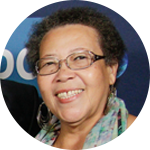Celebrating Women who Lead

What is the importance of having women in leadership positions? For Sana Tarabay, the communications and outreach officer for EDC’s Higher Education Capacity Development project in Lebanon, it’s about elevating women’s voices.
“Being a female leader in my work is not only about my voice being heard, but about amplifying the voices of other women who are pillars of their communities,” Tarabay says.
In celebration of International Women’s Day, we asked EDC staff to reflect on the importance of having women in leadership positions. Here are their responses.
Adwoa Atta-Krah
To me, female leadership is all about representation. Over the years, I have learned that youth often replicate what they see. And if they can see it, they can believe it. This modeling is especially important for girls.
Six years ago, when I was acting chief of party of my youth development project, I traveled to a village in rural Mali to observe one of our technical trainings. Seventeen of the twenty-two participants were girls aged 14 to 21.
“Maybe the manager is coming in another project car,” I heard one young lady whisper as I walked into the room.
“Could she be the one monitoring our trainings? That is not possible,” another one responded.
I smiled to myself as I sat quietly in the back of the training room and thought about how I could engage the two girls in an informal chat after my scheduled visits. I was eager to learn about who they were, who they wanted to become, and who their role models in their community were.
Later, I was able to meet the two girls, and my conversation with Amina and Maimouna was intriguing. They were sisters, and their dream was to grow their livestock fattening and poultry-raising microbusinesses so they could train other youth to be successful entrepreneurs. Because no woman in their village held such an ambitious and influential position, they were unsure that their dream could become a reality. They appreciated the conversation we had and welcomed the opportunity to ask me several questions about my own path and my line of work.
That others, youth in particular, would be encouraged and motivated enough by my example to work harder at achieving their own goals is what inspires me to continue developing the capacities of others.
Xobbe Mushinge
Female leadership means existing in a world where leaders are compassionate, empathetic, inclusive, and collaborative. It means appreciating the wealth of knowledge and skills that women bring to the table and according them the right reward for their efforts. It means having role models whom I can relate to and look up to because I know they have faced similar challenges as me. As a young woman, female leadership is a promise of a better and brighter future!
Currently, we only have 29 female heads of state in the world—out of 190 countries. This gap is a huge milestone, and we still have a lot of work to do to secure the future of female leaders. I want my daughter, who’s only 1 year old now, to one day read up on history and find it strange that we had so few women in leadership roles in 2021.
In my work, I am worried about the millions of girls who have high hopes and dreams for a better future but are forced out of schools due to acute levels of poverty, the high cost of education, child marriages, early pregnancies, and cultural norms.
As women in education, we need to continue to break the barriers that limit girls’ education and to continue to foster empowerment for all women and girls. We have so much to give and so much to contribute.
Sylvaine von Mende
In an African world where women have started to awaken to unfair practices and to fight to be recognized as valued citizens, being a woman in a position of leadership is a double-edged sword.
On one hand, I feel that I am a model for girls and women with whom I have contact. I also represent that education is as important for girls as it is for boys. It is my way to help them see that, in a man’s world, you can bring your softer female voice to achieve meaningful deeds, have an influence, and implement change.
On the other hand, it is a constant uphill fight against contempt, incredulity, traditional cultural values, and unjustified prejudice to be heard and respected.
A leadership position means also to be torn between my eagerness to bring positive change, improving the lives of women and children, and the nagging thought that my interventions may bring more harm than good. Many times, I have asked myself, “Am I doing the right thing? Who am I to tell these women how to run their lives?” Being a woman leader means balancing what seems right to you with what seems right for the people you want to help.
Nalini Bajaj Chugani
Over my 15 years in international development, I have had the great fortune to work with inspiring, thoughtful women leaders committed to improving global education. So many of them are leaders in their own communities trying to create opportunities for girls and young women like themselves.
I am inspired by leaders such as Nazia Umar, a participant in EDC’s MEGA-SkY program in India whom I met a decade ago. Nazia established a first-of-its-kind girls’ madrasa in her village of Uttar Pradesh in 2010, providing secular education to girls.
Female teachers are rare in the remote valleys, plains, and mountains comprising this region of India. Female principals are rarer still. As word spread about the innovative madrasa, demand for enrollment grew dramatically, with school enrollment reaching 220 girls in 2011.
With every challenge Nazia faced, she seemed to get more determined to pursue her visions. She knew all too well that for the girls attending her madrasa, she was not only a principal, but also a role model.
The world needs women leaders like Nazia. If girls never see a woman reading, writing, or doing math, never mind teaching others, how will they picture their own bright futures?
I am hopeful that as we empower women with greater access to education and livelihood opportunities, we will continue to read stories like Nazia’s—of women who seize the opportunities to benefit themselves and their communities and who shine as an example for us all.
Thelma Khelghati
I think that women bring a particular level of caring and empathy to leadership positions.
In my role as a chief of party on EDC’s international projects, I always tried to build a unified team and establish a collaborative culture as opposed to a competitive one. We worked to ensure that the contributions of each employee, regardless of rank or gender, were valued and that there was a spirit of inclusiveness, mutual assistance, and understanding. We also worked to ensure that each employee felt they had a voice and that their voice would be heard.
This culture and spirit were in operation, not only internally, but also in the way that we worked with external partners, such as ministries of education, partner organizations, and communities. We were also attentive to the human needs of staff. If someone in the family died or if there were illnesses, we took a moment to mourn. And during happier occasions, such as births or marriages, we made sure to celebrate. These were important milestones in the lives of employees, and we were sensitive to see them recognized.




